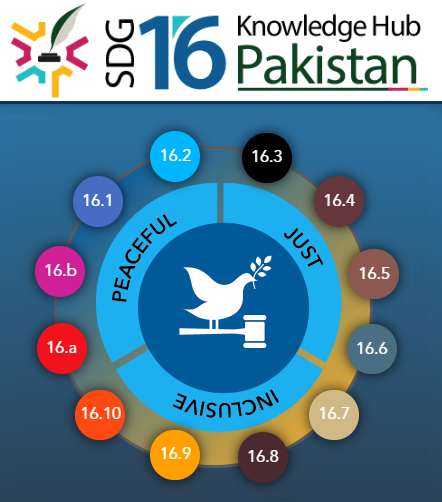

International Day for Judicial Well-being: A Global Call for Action (4 Mar, 2025)
Pakistan Ranks 129 out of 142 in the World Justice Project Rule of Law Index (26 Oct, 2024)
2024 Trafficking in Persons Report: Pakistan (24 June, 2024)
Pakistan ranks second-last in WEF Global Gender Gap Report 2024 (7 Mar, 2025)
The Road to Constitutional Governance & the Rule of Law

Mon, December 10, 2018
On 5th December, a high level event was organized in Islamabad where the first ever local rule of law think-tank with the name Jinnah Centre for the Rule of Law and the national rule of law reform agenda were launched.
Speakers of the event included Mr. Justice Jawwad S. Khawaja (former Chief Justice of Pakistan, and Patron JCfROL),
Mian Raza Rabbani (former Chairman Senate of Pakistan, Patron JCfROL and author A Biography of Pakistani Federalism, Unity in Diversity (NBF, 2012)),
Professor M. Khalid Masud (former Chairman Council of Islamic Ideology; former Professor of Islamic Law; Judge Shari’at Bench, Supreme Court of Pakistan, author and Patron JCfROL),
Mohammed Sarwar Khan (former Federal Secretary LJCP, and CEO JCfROL),
Barrister Shahzad Akbar (Special Adviser on Accountability to the Prime Minister, Trustee and Adviser to JCfROL),
Mr. Tariq Khosa (former Inspector General of Police, Director General Federal Investigation Agency and Secretary Narcotics Control Division),
Ms. Khawar Mumtaz (Chairperson, National Commission on the Status of Women),
Dr. Muhammad Shoaib Suddle (Senior Fellow NUST Global Think tank Network; former Inspector General Police and Director General Intelligence Bureau) and
Dr. Nafisa Shah (Parliamentarian and author – Honour and Violence: Gender, Power and Law in South Asia (OUP, 2016)
The Head of the Jinnah Centre for the Rule of Law Mohammed Sarwar Khan share that the Center is Pakistan’s only independent, non-partisan think-tank dedicated to the study and promotion of rule of law as a multi-disciplinary phenomenon that is critical for the establishment of a State and society that is fair, impartial and inclusive as provided by the Constitution of the Islamic Republic of Pakistan 1973. The Centre proceeds on the basis that the rule of law is vital for sustainable development, poverty alleviation, economic growth, good governance, stability and social cohesion. The Jinnah Centre for the Rule of Law is thus an inclusive and learning policy platform that fills a critical gap enabling stakeholders to come together to study, deliberate, function as a national repository and advocate policy options and solutions for strengthening constitutional governance and rule of law as a self-reflective and an ongoing effort to move forward towards a rule of law-based Pakistan.
Mr. Justice Jawwad S. Khawaja said in Pakistan a case attains finality in 25 to 50 years on an average. He admitted that in Pakistan, administration of justice was neither speedy nor inexpensive. After going through civil court and the Supreme Court, sometime a case takes 25 years to attain finality and in some instances more than five decades. The elite and the rulers think that the country was established for the privileged people, therefore, they apply selective law and constitutional provisions while ignore others, he added.
He went on to say that everyone deems himself all wise and due to this mindset, people were getting fed up with the system. Regarding quality of judgments, the former CJP said that there were about 2,400 judges of the superior judiciary and lower courts and one could ascertain their command over law by reading the decision of 100 of them only. He said the rule of law was equally applicable on the common citizen as well as on the chief justice of Pakistan or head of any state institution.
Prime Minister’s Special Assistant on Accountability Mirza Shahzad Akbar said that governments did not realise the importance of speedy and inexpensive justice, adding that the finance ministry never played the desired role to equip the judiciary with the required facilities. He lamented over lack of research in the field of law. He noted that without free and independent media, there was no concept of accountability.
Speaking on the occasion, Mian Raza Rabbani said the country had never seen the rule of law. He said the country had always remained under the rule of individuals. He added: “Every military dictator imposed laws of their choice to suppress the resistance movement in the country.” He suggested that state institutions, executive, judiciary and the parliament should enter into an agreement that in future the Constitution of 1973 would be implemented in letter and spirit at all cost.
Ms. Khawar Mumtaz and Dr. Nafisa Shah shared the need of gender equality and democratic strengthening for sustainable development in Pakistan. Professor M. Khalid Masud highlighted the importance of strengthening policy research and analysis and the Government’s role as enabler to enhance expertise. During the occasion Mr. Tariq Khosa and Dr. Muhammad Shoaib Suddle identified the gaps in the criminal justice system and the rule of law can play its effective part.
During the event, Jinnah Centre for the Rule of Law also launched the National Rule of Law Reform Agenda that Center develop in partnership with the Peace and Justice Network, which is constituted by over 50 rights-based local civil society organisations, through Federal and provincial consultations and expert interviews to compile a national rule of law reform agenda. It is the first such consultation of its type and magnitude in Pakistan. A distinguishing feature of the consultation is that it focuses on identifying actions necessary for realising the Constitutional goals “for creating an egalitarian society” and “a democratic State based on the Islamic principles of social justice” as informed by the Preamble, Fundamental Rights and Principles of Policy imperatives.
Key needs identified by the rule of law reform agenda makes systemic recommendations so that supply of rule of law services is responsive to citizens’ needs and better aligned with Constitutional goals and ends. Whilst it is not an exhaustive document, it serves as a document for discussion and negotiation with the Government and concerned stakeholders to take rule of law reforms forward.
Copyright © 2026 pjn.org.pk








